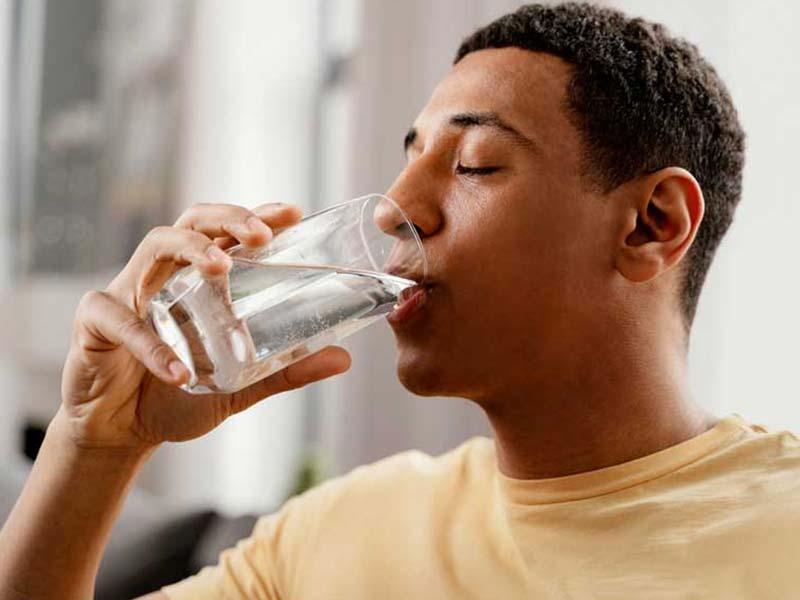
As temperatures soar during the summer months, staying hydrated becomes crucial for maintaining good health and well-being. While drinking water is essential for preventing dehydration, reaching for ice-cold water to cool down may seem like a refreshing choice. However, consuming ice-cold water, especially in excessive amounts, can have adverse effects on your body.
Table of Content:-
Side Effects of Drinking Ice Cold Water in Summer
Here's what you need to know about the potential risks of drinking ice-cold water in summer:
1. Slows Down Digestion
Drinking ice-cold water can slow down the digestion process. When you consume very cold liquids, your body needs to work harder to bring the temperature of the water to match your internal body temperature. This can temporarily slow down the rate at which food is digested and absorbed in the digestive tract, leading to discomfort, bloating, and indigestion.
2. Constricts Blood Vessels
Ice-cold water can cause the blood vessels in the stomach and intestines to constrict. This constriction can reduce blood flow to the digestive organs, impairing their ability to efficiently break down food and absorb nutrients. Over time, this can lead to digestive issues such as cramps, constipation, and nutrient deficiencies.

Also Read: 8 Early Signs of Vaginal Cancer: Expert Shares What You Need to Know
3. May Trigger Migraines
For some individuals, consuming very cold beverages, including ice-cold water, can trigger migraines or headaches. The sudden cold temperature can cause blood vessels in the head to contract and then expand rapidly, leading to headaches or migraines, especially in those prone to such conditions.
4. Exacerbates Tooth Sensitivity
Drinking ice-cold water can worsen tooth sensitivity, especially if you already have sensitive teeth or dental issues. The extreme cold can irritate the nerves in your teeth, causing sharp pain or discomfort. Over time, frequent exposure to ice-cold water may damage tooth enamel, leading to increased sensitivity and dental problems.

5. Disrupts Hydration Levels
While it may seem counterintuitive, consuming ice-cold water can actually disrupt your body's hydration levels. Very cold water can shock your system and cause your body to divert energy to regulate its temperature instead of absorbing the water. As a result, you may not rehydrate as effectively as you would with water at a moderate temperature.
6. Impairs Throat Health
Drinking ice-cold water can also have negative effects on your throat health. The cold temperature can cause the muscles in your throat to contract, leading to throat pain or irritation, especially if you have a sensitive throat or are prone to conditions like tonsillitis or pharyngitis.
Also Read: 8 Early Signs of Vaginal Cancer: Expert Shares What You Need to Know
7. Decreases Energy Levels
Consuming ice-cold water can temporarily decrease your energy levels. When your body expends energy to warm up the cold water, it can leave you feeling sluggish or tired. This can be particularly noticeable during physical activity or exercise, where maintaining hydration and energy levels is essential.
8. Compromises Immune Function
Regularly drinking ice-cold water may compromise your immune function over time. Cold beverages can weaken the immune system by slowing down the movement of immune cells and making it easier for viruses and bacteria to take hold. This can increase your susceptibility to infections and illnesses, especially during the summer months when viruses like the common cold are still prevalent.
Bottomline
While an occasional glass of ice-cold water may provide temporary relief from the summer heat, it's essential to be mindful of the potential adverse effects, especially when consumed in excess. Opting for water at a moderate temperature, such as cool or room temperature, is generally a safer choice for staying hydrated without putting additional strain on your body. Remember to listen to your body's cues and prioritise your health and well-being, even during the hottest days of summer.
Also watch this video
How we keep this article up to date:
We work with experts and keep a close eye on the latest in health and wellness. Whenever there is a new research or helpful information, we update our articles with accurate and useful advice.
Current Version